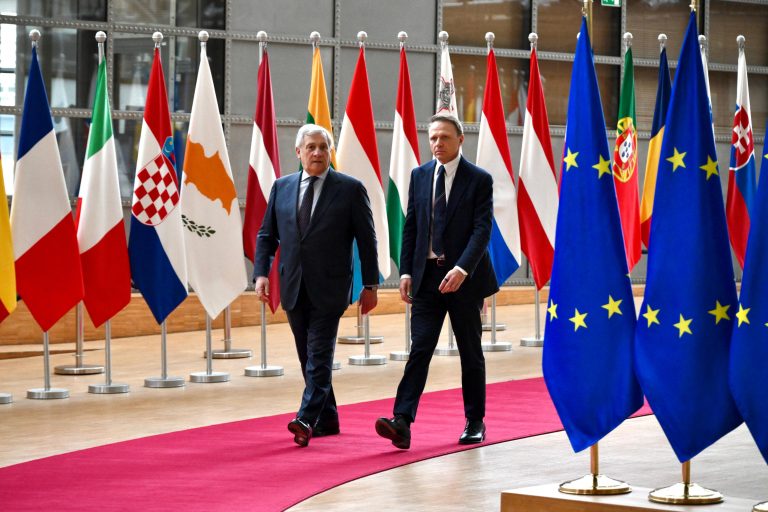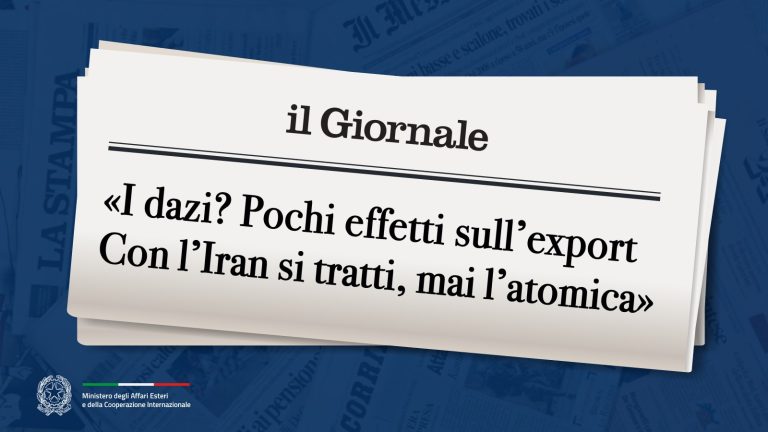Security, energy, immigrants. In the background, the Italian military and economic support for the defence and reconstruction of Ukraine. The Mediterranean tour of Deputy Prime Minister and Foreign Minister Antonio Tajani moved along these lines. Turkey, Tunisia. Finally Egypt, from which yesterday an opening came on the Regeni and Zaki cases, as well as the commitment to send up to 3 billion cubic metres of liquefied natural gas (LNG) to Italy by the end of the year, Minister Tajani explained to the daily Il Messaggero, “but the Piombino regasification plant shall be in operation next spring”.
Minister, what is the objective of these missions to the Mediterranean region?
«The aim is above all to respond to the energy crisis and tackle the issue of irregular immigration. This is the reason why we want to resume direct contacts with all the governments of the region, as well as coordination on crucial issues».
Like Libya?
«Yes, the stabilization of Libya is decisive to slow down irregular immigration and face a terrorist threat that rises from the Sahel towards the Mediterranean region. Countries such as Algeria, Turkey and Egypt have influence over some of the protagonists of political and military life in Libya. We must talk to each other, limit conflicts, create a positive agenda and favour presidential and general elections that legitimize new political leaders in Libya».
Do you believe that countries with strong rivalries like the ones you mentioned can really agree on a peace process? Not to mention rivals such as Russia, the United States, the Emirates, Qatar, etc.
«I cherish no illusions it will be an easy process, but it is an obligation to try. We suggest to everyone – and I did so in Cairo also with President Sisi and with my counterpart Shukri – that any dialogue or mediation initiative should come under the guidance of the United Nations. The UN path is the most reasonable and balanced one and Italy fully supports it».
You are the Italian Foreign Minister who returned to Egypt after years, a country with which the case of Giulio Regeni remains outstanding. Did you talk about it with President Sisi?
«I asked for Egyptian cooperation – from the President and the Foreign Minister – on the Regeni and Zaki cases. They assured me of Egypt’s willingness to solve the problems. There was no reticence to discuss the issue on the Egyptian side, and indeed the first to talk about it was President Sisi. He told us that he would work to remove the remaining obstacles to the solution of the two cases».
In Cairo you also saw the Secretary of the Arab League, Aboul Gheit, and the Grand Imam of Al Azhar, Ahmad Al Tayoub.
«I tried to talk to all the protagonists of this decisive country for the future of the Mediterranean region. Egypt is a decisive protagonist with which we can exchange views to find right and positive results. There is also the energy issue: Egypt has also started exporting gas to Italy. Thanks to ENI’s discoveries, Egypt first achieved self-sufficiency and then became an exporting country. For Italy it is strategically safe to have multiple suppliers, with various supply channels».
How much gas is starting to arrive to Italy from Cairo?
«A billion cubic meters had already arrived in 2022. In 2023 they should be over 3 billion, but the Piombino regasification plant shall be operational next spring. Only this confirms how important Egypt is to us, and vice versa».
Do we have enough infrastructure to invest in gas? Is it necessary to strengthen the network of regasification plants?
«The Italian structures have bottlenecks. Apart from the Piombino issue, there is the issue of connecting the South to the North of Italy, and of overcoming the difficulties that slow down supplies from the Mediterranean region».
From Egypt to Tunisia. Is there a plan to slow down the departure of boats to Italy?
«We went to Tunis with Interior Minister Piantedosi. We met the President together and then our counterparts. We must support the economic strengthening of Tunisia, a country in deep economic difficulty. These conditions lead many Tunisian citizens, even from the middle class, to try the crossing to Sicily».
Besides the Mediterranean, there is also the Western Balkans issue: you have organized a national Conference that will be held in Trieste tomorrow. What are the goals?
«For too long the Balkans have ended up outside the scope of Italian politics and media. After the war years, after the shocks of Yugoslavia’s dissolution, Italy has almost forgotten this region. But in the Western Balkans the winds of confrontation have been blowing again for months, above all between Serbia and Kosovo. The Trieste Conference will be a national conference between the Ministry of Foreign Affairs, the Economy and Finance Ministry (MEF), foreign trade agencies and companies interested in going into the field. We want to make trade and development grow in that region to counter the explosion of new conflicts».
In Turkey you also discussed the war in Ukraine. Is Turkey capable of mediating for a path to peace?
«Turkey has already implemented various mediation initiatives, from the very important one on wheat and the export of Ukrainian cereals to those for the release of prisoners. Someone is trying to ask some European countries to soften their positions to favour negotiations with Putin. But an agreement will only be possible if Russia decides to stop military operations, and if it decides to stop the indiscriminate bombing of civilians and strategic installations. Only then will Europe be able to ask Ukraine to start negotiations».
Will Italy send Samp-t to Kiev?
«We are keeping our commitments. We are working on some technical problems relating to missile systems. We will obviously need the green light from Parliament».
After weapons, the reconstruction. In March an international Summit will be held in Rome. Is Italy leading the process?
«We are already working together with the EU Commission. We will provide our contribution to invest in sectors such as agri-food, infrastructure, electricity and we will help the country get back on its feet. In due course, an EU “Recovery Fund” for the reconstruction of Ukraine can be envisaged».
You have recently met the Director General of the UN International Atomic Energy Agency (IAEA), Rafael Grossi. Is there a plan to defend the security of the Zaporizhzhia plant?
«Grossi has very clear ideas. He knows well the behaviour of the Russian and Ukrainian armies around that extremely sensitive installation. He is making a series of trips to verify the possibility of “sanctuarizing” nuclear power plants, as they say at the IAEA. I consider it a very important first step».
Minister, the government has one hundred days, and the majority seems to be divided at times. Will you find the square on the concessions to seaside resorts?
«Debates are not divisions. We will overcome this, too, cohesively. We will find a solution to protect our businesses in compliance with EU rules».



